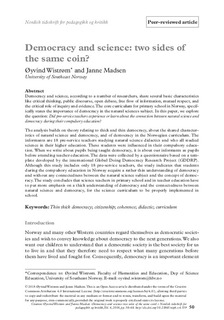Democracy and science: two sides of the same coin?
Journal article, Peer reviewed
Published version
Permanent lenke
http://hdl.handle.net/11250/2581260Utgivelsesdato
2018Metadata
Vis full innførselSamlinger
Sammendrag
Democracy and science, according to a number of researchers, share several basic characteristics like critical thinking, public discourse, open debate, free flow of information, mutual respect, and the critical role of inquiry and evidence. The core curriculum for primary school in Norway, specifically states the importance of democracy in the natural sciences subject. In this paper, we explore the question: Did pre-service teachers experience or learn about the connection between natural science and democracy during their compulsory education? The analysis builds on theory relating to thick and thin democracy, about the shared characteristics of natural science and democracy, and of democracy in the Norwegian curriculum. The informants are 18 pre-service teachers studying natural science didactics and who all studied science in their higher education. These students were influenced in their compulsory education. When we write about pupils being taught democracy, it is about our informants as pupils before attending teacher education. The data were collected by a questionnaire based on a template developed by the international Global Doing Democracy Research Project (GDDRP). Although this study includes only 18 pre-service teachers, the study indicates that students during the compulsory education in Norway acquire a rather thin understanding of democracy and without any connectedness between the natural science subject and the concept of democracy. The study concludes that science teachers in primary school and in teacher education have to put more emphasis on a thick understanding of democracy and the connectedness between natural science and democracy, for the science curriculum to be properly implemented in school.
Beskrivelse
This is an Open Access article distributed under the terms of the Creative Commons Attribution 4.0 International License allowing third parties to copy and redistribute the material in any medium or format and to remix, transform, and build upon the material for any purpose, even commercially, provided the original work is properly cited and states its license

